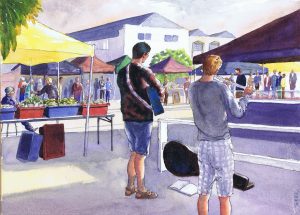By Lynne Baab —
Two people meet a stranger on a road. As they walk together, the stranger gives them a new perspective on the Hebrew Scriptures. When they arrive at their home, they invite the stranger in for a meal.
At the meal, the stranger picks up bread, breaks it and hands it to the other two. In that moment, the stranger is revealed to be Jesus.
In the Road to Emmaus story (Luke 24:13-35), a guest at the meal – a stranger – briefly becomes the host, the Lord Jesus Christ. People who write and teach about hospitality call this the guest-host shift, and this shift changes the power dynamics in hospitality interactions.
Mother Teresa brought this shift to the world’s attention when she talked about meeting Jesus in the poor, sick and dying to whom she ministered. I can remember, back in the 1990s, feeling befuddled the first time I heard someone quote Mother Teresa about this. Meeting Jesus in someone we are helping seemed like such a strange idea. When we help people in need, aren’t we – the helpers – the ones who are acting like Jesus and representing him? How can the opposite be true?
Later, in the early 2000s when Christians began writing about the theological significance of hospitality, Mother Teresa’s ideas began to make more sense to me. I began to see the connections with Matthew 25. In verses 31 to 34, Jesus describes a scene where the Son of Man separates people into two categories, and the ones who are placed at Jesus’ right hand hear these words:
“Come, you that are blessed by my Father, inherit the kingdom prepared for you from the foundation of the world; for I was hungry and you gave me food, I was thirsty and you gave me something to drink, I was a stranger and you welcomed me, I was naked and you gave me clothing, I was sick and you took care of me, I was in prison and you visited me” (verses 34-36).
The people at Jesus’ right hand ask when they gave food, drink or a welcome to him. Jesus replies: “Truly I tell you, just as you did it to one of the least of these who are members of my family, you did it to me” (verse 40).

Illustration: Buskers at the Dunedin Farmers Market by Dave Baab
When we host people in our homes for meals or extend a welcome of any kind to another person, we can expect that we might meet Jesus in that person. And if we are meeting Jesus in someone else, then that person in effect becomes the host because Jesus is the King and Lord of all.
Why does this matter? Extending care to another person has the tendency to promote the carer to a position of prominence. After all, we often say, “It’s better to give than to receive.” If I’m doing the giving, caring or welcoming, then I’m the generous one. I’m the one whose life is together enough that I have the resources to extend a helping hand. I’m not needy or vulnerable or weak. Look at me, I’m strong! Look at how wonderful I am!
Jesus turns this upside down. The person receiving care gives to the one who appears to be strong. In fact, the person receiving care takes the form of Jesus, revealing unexpected truth.
This Jesus, a man of humility, calls us to be humble in the same way. He calls us to watch for the ways he is revealed to us through unexpected people.
As other writers in this series have noted, hospitality can be fun, enriching, frustrating, and even painful. In the variety of ways we extend hospitality to others, Jesus is there, turning things upside down.

1 comment
I am always impressed with the take folks have on the Emmaus story!
I did a labyrinth walk on this theme several years ago.
The message that came to me?
Cleopas chose the unknown disciple. God sent Jesus to join them.
Q: Who do I choose to companion me on the road?
Q: Who does God send?
Q (the biggie): Am listening to them!